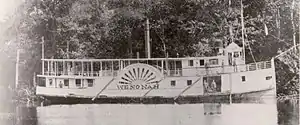 Muskoka's first steamship, the sidewheeler Wenonah. | |
| History | |
|---|---|
| Operator | Muskoka Navigation Company |
| Completed | 1866 |
| General characteristics | |
Wenonah was a sidewheel steamship, built by Alexander Peter Cockburn, on Lake Muskoka, in 1866.[1][2] She was the first vessel employed by the Muskoka Navigation Company. She carried passengers, mail and freight, and towed logs for the lumber industry, mainly on a cluster of connected lakes that covered much of the county of Muskoka, Ontario, Canada. Some sources also say she was the first steamship on the Magnetawan River, north of Muskoka.
Cockburn was elected to the Ontario Provincial Parliament in 1867. According to the Dictionary of Canadian Biography, "[by] the spring of 1869 he had induced the Ontario government to build a lock on the Indian River at Port Carling and a canal at Port Sandfield, to allow steamers to extend their runs to lakes Rosseau and Joseph." Cockburn also played a role in passing legislation to have rail service extended to Gravenhurst, one of the other ports served by the Muskoka steamships.
Wenonah was abandoned in 1886, in favor of newer vessels.[3]
In 2002 a modern excursion vessel, the Wenonah II, was constructed to give passengers the look and feel of a traditional Muskoka Steamship.[4] She was named in honour of the original Wenonah, although her appearance more closely matches vessels like her berthmate, the heritage vessel RMS Segwun, built a few decades later.
References
- ↑ Richard S. Tatley. "Cockburn, Alexander Peter". Dictionary of Canadian Biography. University of Toronto. Archived from the original on 2012-10-15.
- ↑
Richard Tatley (2018-03-23). "Tuesday Tales from the Archives – 1866 and all that!". Muskoka Steamships. Archived from the original on 2018-09-07.
Despite all this, a steamboat was indeed built on Lake Muskoka in 1866, and it did ultimately prove successful.
- ↑
Steamboats on the Lakes. James Lorimer & Company Ltd. 2005. ISBN 978-1-55028-885-8.
The railway, reaching Gravenhurst in 1875, provided a route for getting lumber to the southern markets and for bringing passengers into the Muskoka Lakes. By 1885, when the Wenonah was abandoned, the thin soil of Muskoka had forced many of the settlers off the land.
- ↑
"Muskoka Steamships". Muskoka Steamships. Archived from the original on 2018-02-22. Retrieved 2018-09-07.
Wenonah II, a modern interpretation of a traditional steamship, is named in honour of Wenonah, the first steamship to sail Lake Muskoka.